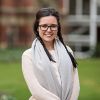
Anna Hall
- Course: Arabic and Middle Eastern Studies
Please tell us a bit about yourself and your background?
I was born in England to English parents but grew up in Cyprus until the age of 17. I moved back to England for Sixth Form. I took two gap years before starting university, working as an assistant manager at a cafe/delicatessen in Oxford. Before learning Arabic, I studied French and Greek up until A Level.
What made you want to apply to your course and to Leeds?
I wanted to study languages and so applied to lots of different universities to study various languages. I was accepted to the University of Leeds to study Arabic and French (I changed my course to Arabic and Middle Eastern Studies at the start of my third year) and thought that Arabic would be something completely different and a good challenge for me! To be completely honest, I wasn’t really sure what subject I wanted to study or what I wanted to do in the future but after my first week of studying Arabic, I realised that it was the best decision I could have made.
What is it that makes you passionate about your area of study?
I am passionate about languages and now, I am fascinated by the Arabic Language. I find that, because of its root and pattern system, it is very logical and if I don’t know an answer, I can generally work it out using this system. It is a rich and complex language and I feel that I will always be learning new grammatical structures, vocabulary and writing styles. My Middle Eastern Studies modules are very interesting and particularly important in this day in age. They will help me to have a solid foundation of knowledge to prepare me for when I travel to/ work in the Middle East.
What aspects of the course did you enjoy the most?
The best part about my course is the Year Abroad. I spent the year in Fes, Morocco and had the opportunity to live with a host family who helped me to improve my speaking and listening skills. I met students from all over the world, learnt a fair amount of the Moroccan dialect and was able to gain an insight into the Moroccan way of life and culture. It was an unforgettable adventure, filled with travelling, exotic food, an endless supply of mint tea and a lot of eye-opening experiences. Most universities send their students on their Year Abroad in the third year but I think that going in my second year was so much more valuable. When I arrived, I felt like I didn’t understand a thing and my language skills were very limited but being surrounded by people who could not speak my language forced me to learn so much more quickly than if I had been in a classroom in Leeds.
What would you say about the learning facilities in your School and at the University in general?
There are plenty of libraries and study spaces available for all students to get their work done outside of their homes. A huge benefit for students is that there are study areas available 24/7. I struggled in my first year as I was only aware of the libraries and I find it difficult to study in a busy environment, even in the silent study areas because of the vast amount of students there. However, in my third year, I discovered the Emmanuel Centre, which is a quiet living room type space where I can make my own cup of tea and sit next to a warm radiator while I do my work. I use this space as often as I can and find I can concentrate there much better than in a packed library.
What do you plan to do when you’ve finished your course, and how do you think the skills and knowledge you’ve developed at Leeds will help with these plans?
I am planning on taking a Masters in Translation and Interpretation once I finish. I would ideally like to do this in an Arabic speaking country in order to immerse myself in the language and culture. This year I am taking the Advanced Grammar and Translation module which has pushed me to develop my skills in these subjects. The Arabic teachers at Leeds are excellent and are all extremely strong in their subjects. Tutors will take time out of their day to help you with anything you are struggling with. For example, my first year Arabic teacher, Dr Rasha, is providing teacher training sessions for those who are interested. Although I don’t plan on going down the teaching route, I find that these sessions give me more options for the future and also help me to solidify the knowledge I already have in the Arabic language.

